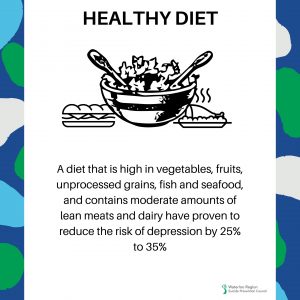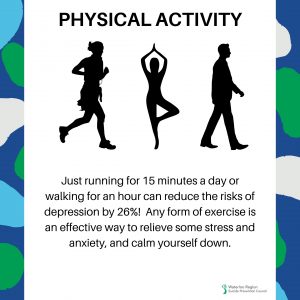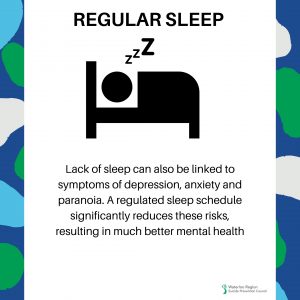Each week in this series, we’ll look at one category of Resilience & Protective factors and share 3 factors within that category. This week, we’ll be exploring Biophysical Resilience & Protective Factors. Biophysical factors refer to the biological and physical needs of our bodies. We know that physical health is closely linked to mental health, and that by taking care of our bodies we are also nourishing our minds. Research has shown that incorporating healthy diet, physical activity, and regular sleep into our lives can promote positive mental health and protect against suicide risk or mental health struggles.
1: Healthy Eating

Eating well is one part of a healthy lifestyle that promotes both physical and mental wellness. Though we may not always think about it, the foods we eat can be important to maintaining positive mental health. One way that healthy eating impacts mental wellness is through the neurotransmitter Serotonin (known as the “happy chemical”), which contributes to wellbeing and happiness. 95% of this chemical is produced in the gastrointestinal tract, which is also responsible for extracting nutrients and digesting the food we eat. A diet that is high in vegetables, fruits, unprocessed grains, fish and/or seafood, and contains moderate amounts of lean meats and dairy have proven to reduce the risk of depression by 25% to 35% (source).
Local Community Resources:
The Region of Waterloo’s page on healthy eating includes more information on healthy foods and how to maintain a healthy diet.
The Foodbank of Waterloo Region maintains a network map of Community Food Assistance services. View their map of programs that provide food to those requiring food assistance on their website. Their network map includes great resources such as St. John’s Kitchen in Kitchener, Community Support Connection’s Meals on Wheels program, and more.
Zero Waste Bulk has a mission to reduce waste and food waste, and is furthering this mission by hosting the Community Fridge KW. According to Zero Waste Bulk, “A community fridge is a non-for-profit fridge consisting of fresh, donated foods that anyone can take from for FREE. It is designed to reduce food waste while also helping those who struggle to access fresh foods.”
2: Active Lifestyle

Like healthy eating, an active lifestyle can promote both physical and mental wellness and can be a very effective way to protect against depression, anxiety and stress. One way physical activity impacts mental wellness is through the release of endorphins in the brain when we are active, which releases feelings of happiness and improves energy levels. Just running for 15 minutes a day or walking for an hour can reduce the risks of depression by 26% (source). An active lifestyle can be promoted in many ways, such as choosing active modes of transportation such as cycling or walking instead of driving, or working small boughs of activity into your daily live – it doesn’t have to involve large amounts of time or money to get moving.
Local Community resources:
The Region of Waterloo’s page on physical activity contains more information on physical activity, including links to city-run programming and active recreation opportunities.
Kitchener Waterloo AccessAbility is a consumer-driven, non-profit information and resource centre supporting adults with physical disabilities; their services include exercise and fitness programming for all abilities.
3: Proper Sleep

A regular sleep schedule plays a crucial role in mood management and overall mental health. Sleep deprivation is directly related to irritability and anger, and poor sleep itself can become the cause of stress. Lack of sleep can also be linked to symptoms of depression, anxiety and paranoia. A regulated sleep schedule significantly reduces these risks, resulting in much better mental health (source).
Local Community resources:
Waterloo Wellington Self-Management Program runs a Better Sleep program for individuals. During this free, 5 week group session you will learn strategies to help relax your mind and body, to decrease insomnia, and to fall asleep or back to sleep easily.
Canadian Mental Health Association Waterloo Wellington compiled a list of 13 tips for healthcare works for improving sleep during COVID-19.
Carizon recently shared an infographic about getting a good sleep on their twitter with some great tips.


